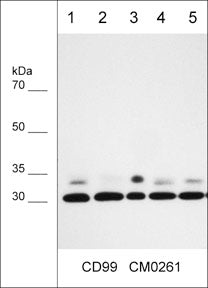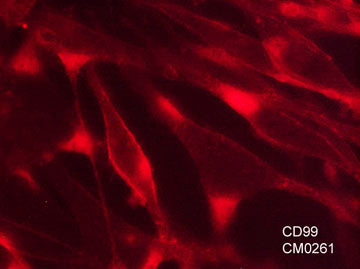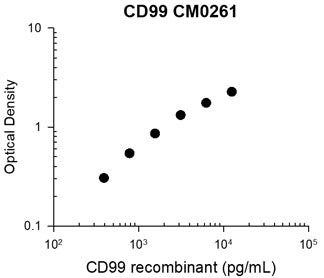Anti-CD99 (Extracellular region) Antibody
- SPECIFICATION
- CITATIONS
- PROTOCOLS
- BACKGROUND

Application
| WB, IHC |
|---|---|
| Primary Accession | P14209 |
| Reactivity | Bovine |
| Host | Mouse |
| Clonality | Mouse Monoclonal |
| Isotype | IgG1 |
| Clone Names | M026 |
| Calculated MW | 18848 Da |
| Gene ID | 4267 |
|---|---|
| Other Names | CD99 antigen, 12E7, E2 antigen, MIC2 T-cell surface glycoprotein E2, MIC2X, MIC2Y |
| Target/Specificity | The glycosylated transmembrane protein CD99 is involved in many essential cellular functions including cell adhesion, migration, cell death, differentiation, and intracellular protein trafficking. The CD99 gene encodes two distinct proteins, type I is 32 kDa and type II is 28 kDa, which are a result of the alternative splicing of the cytoplasmic region. These CD99 isoforms are expressed in a cell-type-specific manner and may have distinct functions. CD99 is overexpressed in several types of sarcomas, lymphomas, gliomas, neuroendocrine tumors, and some breast cancers. In these tumors, CD99 may have oncogenetic functions that promote migration, invasion, and metastasis of tumor cells. However, other neoplasms, carcinomas, and sarcomas have CD99 expression in benign or early-stage tumors, but lower expression in the advanced-stage counterparts. In these tumors, CD99 may have oncosuppressor signaling, and its re-expression can lead to the reversal of malignancy. Thus, CD99 is an important membrane protein involved in many aspects of cell migration and adhesion in normal and diseased cells. |
| Dilution | WB~~1:1000 IHC~~1:100~500 |
| Format | Protein G Purified |
| Storage | Maintain refrigerated at 2-8°C for up to 6 months. For long term storage store at -20°C in small aliquots to prevent freeze-thaw cycles. |
| Precautions | Anti-CD99 (Extracellular region) Antibody is for research use only and not for use in diagnostic or therapeutic procedures. |
| Shipping | Blue Ice |

Thousands of laboratories across the world have published research that depended on the performance of antibodies from Abcepta to advance their research. Check out links to articles that cite our products in major peer-reviewed journals, organized by research category.
info@abcepta.com, and receive a free "I Love Antibodies" mug.
Provided below are standard protocols that you may find useful for product applications.
Background
The glycosylated transmembrane protein CD99 is involved in many essential cellular functions including cell adhesion, migration, cell death, differentiation, and intracellular protein trafficking. The CD99 gene encodes two distinct proteins, type I is 32 kDa and type II is 28 kDa, which are a result of the alternative splicing of the cytoplasmic region. These CD99 isoforms are expressed in a cell-type-specific manner and may have distinct functions. CD99 is overexpressed in several types of sarcomas, lymphomas, gliomas, neuroendocrine tumors, and some breast cancers. In these tumors, CD99 may have oncogenetic functions that promote migration, invasion, and metastasis of tumor cells. However, other neoplasms, carcinomas, and sarcomas have CD99 expression in benign or early-stage tumors, but lower expression in the advanced-stage counterparts. In these tumors, CD99 may have oncosuppressor signaling, and its re-expression can lead to the reversal of malignancy. Thus, CD99 is an important membrane protein involved in many aspects of cell migration and adhesion in normal and diseased cells.
If you have used an Abcepta product and would like to share how it has performed, please click on the "Submit Review" button and provide the requested information. Our staff will examine and post your review and contact you if needed.
If you have any additional inquiries please email technical services at tech@abcepta.com.













 Foundational characteristics of cancer include proliferation, angiogenesis, migration, evasion of apoptosis, and cellular immortality. Find key markers for these cellular processes and antibodies to detect them.
Foundational characteristics of cancer include proliferation, angiogenesis, migration, evasion of apoptosis, and cellular immortality. Find key markers for these cellular processes and antibodies to detect them. The SUMOplot™ Analysis Program predicts and scores sumoylation sites in your protein. SUMOylation is a post-translational modification involved in various cellular processes, such as nuclear-cytosolic transport, transcriptional regulation, apoptosis, protein stability, response to stress, and progression through the cell cycle.
The SUMOplot™ Analysis Program predicts and scores sumoylation sites in your protein. SUMOylation is a post-translational modification involved in various cellular processes, such as nuclear-cytosolic transport, transcriptional regulation, apoptosis, protein stability, response to stress, and progression through the cell cycle. The Autophagy Receptor Motif Plotter predicts and scores autophagy receptor binding sites in your protein. Identifying proteins connected to this pathway is critical to understanding the role of autophagy in physiological as well as pathological processes such as development, differentiation, neurodegenerative diseases, stress, infection, and cancer.
The Autophagy Receptor Motif Plotter predicts and scores autophagy receptor binding sites in your protein. Identifying proteins connected to this pathway is critical to understanding the role of autophagy in physiological as well as pathological processes such as development, differentiation, neurodegenerative diseases, stress, infection, and cancer.




